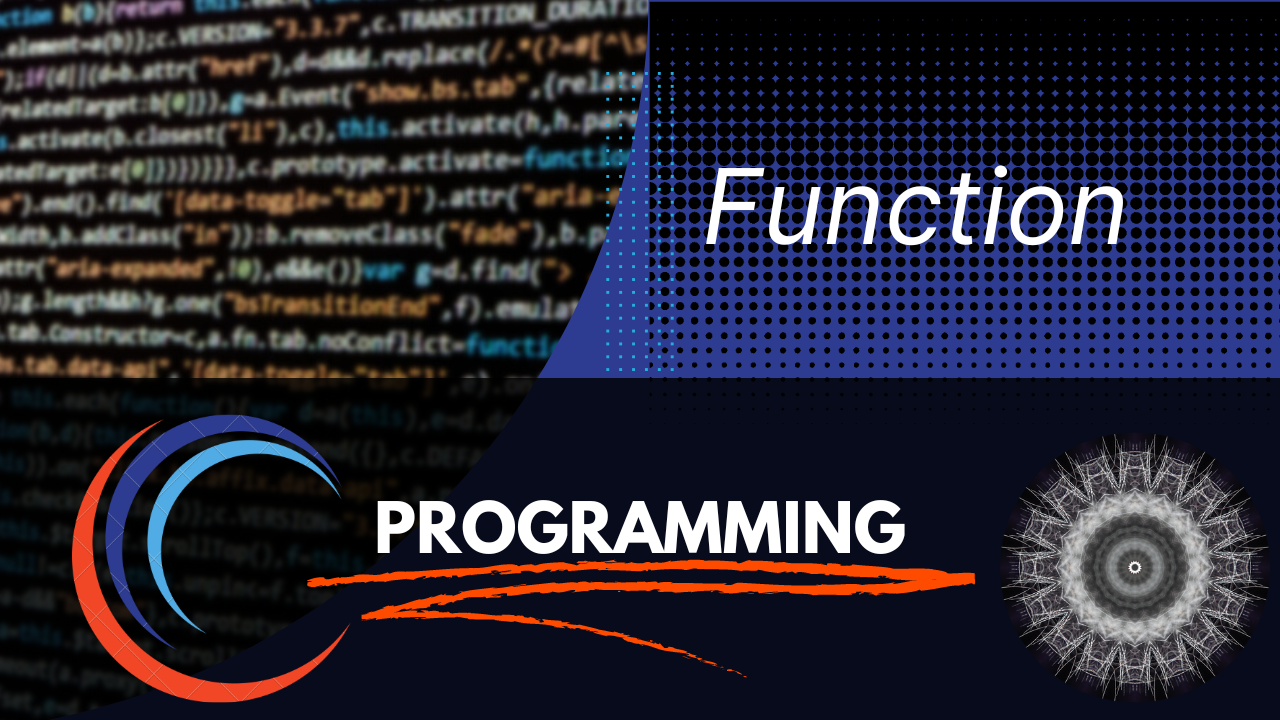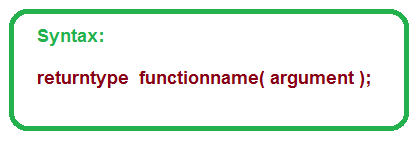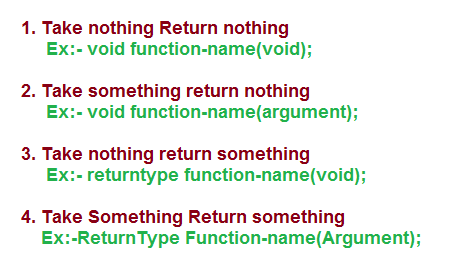
function in c programming
Diagrammatic representation of the function
Functions in C programmingFunctions are the building blocks of C programs. They allow you to break down your code into smaller, reusable pieces. This makes your code more modular, easier to read and maintain, and more efficient.Function definitionA function definition consists of the following parts:
-
Return type: The type of data that the function returns.
-
Function name: A unique identifier for the function.
-
Parameter list: A list of the parameters that the function accepts. The parameters are enclosed in parentheses.
-
Function body: The code that the function executes. The function body is enclosed in curly braces ({ and }).
Function Deceleration in c programming

Whenever we are declaring the function there are Four ways to declare the function.

Function call :
To call a function, you simply use the function name followed by parentheses. If the function accepts parameters, you must pass them in parentheses after the function name. For example, the following code calls the factorial() function:
int factorialResult = factorial(5);Function scopeThe scope of a variable is the region of code in which the variable is visible and can be used. The scope of a function parameter is the function body. The scope of a variable declared inside a function body is the function body itself.Function recursionA recursive function is a function that calls itself. This can be useful for solving problems that can be broken down into smaller subproblems of the same type.
For example, the factorial() function is a recursive function.Advantages of using functionsThere are many advantages to using functions in C programming, including:
-
Modularity: Functions allow you to break down your code into smaller, reusable pieces. This makes your code more modular and easier to read and maintain.
-
Efficiency: Functions can improve the efficiency of your code by avoiding duplication of code.
-
Readability: Functions can make your code more readable by grouping related code together.
-
Maintainability: Functions can make your code more maintainable by making it easier to isolate and fix bugs.
Here are some examples of functions in C programming:
-
printf(): Prints formatted output to the console.
-
scanf(): Reads formatted input from the console.
-
strlen(): Returns the length of a string.
-
strcmp(): Compares two strings and returns 0 if they are equal, a negative value if the first string is less than the second string, and a positive value if the first string is greater than the second string.
-
strtok(): Breaks a string into tokens based on a delimiter.
-
atoi(): Converts a string to an integer.
-
itoa(): Converts an integer to a string.
Conclusion
Functions are a powerful tool in C programming. They allow you to break down your code into smaller, reusable pieces, which can make your code more modular, efficient, readable, and maintainable.
Note: if we are dealing with our own function, we need to declare the function above the main and we need to define the function below the main and we need to call the function inside the main.
Further Reading:
Enroll Now:
[ C-Programming From Scratch to Advanced 2023-2024] "Start Supercharging Your Productivity!"
Contact Us:
- For any inquiries, please email us at [info@electro4u.net].
- Follow us on insta [ electro4u_offical_ ] for updates and tips.
Note: If you encounter any issues or specific errors when running this program, please let me know and I'll be happy to help debug them

